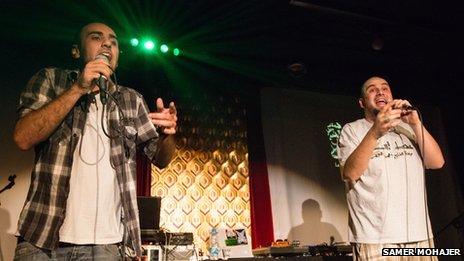Syria conflict finds a voice in hip-hop
- Published

As the conflict in Syria rages, the violence and chaos is finding expression among writers and musicians, including one hip-hop act from Damascus, write Samer Mohajer and Fay Rajpar in Beirut.
"To be honest, I don't really like hip hop. I don't like the music."
My apparently unenthusiastic neighbour at a concert given by Syrian hip hop group LaTlateh in Beirut seemed to be in good company.
Crammed into a tiny, smoky concert hall, most of the unsmiling crowd was sitting at tables, and not a single person was dancing.
This was not a typical hip-hop concert.
A Western observer might put the limp atmosphere down to the fact that the culture of hip-hop is still fledgling in the Arab world, its development stunted by its incompatibility with some Arab regimes.
In fact, hip-hop has never been so popular in the Middle East.
Music and revolution have always gone hand-in-hand and the Arab Spring is no exception.
The Syrian uprising is providing optimum conditions for straight-talking rap to flourish, and one particular Syrian band, LaTlateh, are articulating the feelings of a nation.
"I don't like the music, but I like the words. I am Syrian. I feel the words. The lyrics really express my feelings. We aren't dancing because we are listening to the lyrics," my neighbour said.
A clip from LaTlateh's new track One Two Three
LaTlateh is a Damascus-based three-piece hip-hop outfit comprising Al Sayyed Darwish, Watar and Abu Koulthoum. They perform alongside producer Dab Snakkr, whose music documents the day-to-day struggle of the Syrian uprising.
"The situation in Syria is what motivates us to write. How can we sit by and watch all the pain and suffering that is going on around us and not speak out?"
In the first few months of the revolution, so much of Syria's cultural elite left the country, either hounded by the regime or in search of better working conditions.
LaTlateh has garnered a huge following across the region because they remained in their base in Damascus, travelling between the embattled capital and Lebanon. They write lyrics about Syrians, for a Syrian audience.
The Third Line
The boys, along with a wider group of Arab musicians, are contributing peacefully to the popular uprising through a movement called The Third Line.
The Third Line advocates a third alternative to the existing pro- and anti-regime dichotomy, and aims to uphold the truth and serve Syria's national interests.
"Everybody has a view but there is hypocrisy on all sides. We are trying to find the truth. The third line is about breaking down divisions because each party is only benefiting from its own side," Dab Snakkr said.
The group want to promote freedom of expression and democracy and are against President Bashar al-Assad's regime.
Each member brings to the table his own interpretation of the situation in Syria, reflecting the conflicting opinions which exist in Syrian society.
The crisis in Syria has afforded LaTlateh a voice, but the group faced many obstacles before arriving at this point - and they are far from having overcome them all.
Al Sayyed Darwish's critique of early Arab hip-hop is nothing short of disparaging, and the group are keenly aware of the fact that real exposure for the Arab hip-hop scene has come with the revolution. Watar describes the pre-revolution hip-hop scene as weak.
Prior to the uprisings, trying to make music in Syria's political and financial climate was not easy.
"Our problems were pretty simple. There was simply no support. We did our first concert by paying for it ourselves," Watar says.
"We did other concerts with money from the US embassy and French cultural centre - but it was only really symbolic funding. Of course there are always problems with cultural activities in Syria. The regime was afraid of cultural expression," he adds.
Traditional parallels
The development of hip-hop in Syria has not just been limited by the political situation. Most Syrians' experience of rap has been through mainstream US or British artists, rapping about issues alien to most of Syrian society.
But there are some aspects of rap which parallel oral traditions in the Middle East - from the 1,000-year old Levantine tradition of Zajal, semi-sung, semi-spoken poetry battles akin to modern day rap battles, to the revered oral story-telling tradition of the Hakawati.
The situation in Syria has forced Syrian hip-hop onto the international stage. Political oppression means they can no longer perform in Syria and now LaTlateh is forced to widen its audience and travels the Middle East to perform.
"Syrian music is no longer cut off from the world. We can now contribute as Syrians to the creative world in a way we couldn't before," explains Abu Koulthoum.
For Dab Snakkr so far the uprising has meant that LaTlateh can express itself in a way they hope can be preserved, whatever the future holds for Syria.
"The most important thing right now is to create a space for free expression - a freedom of expression that was stifled to the point that two or three years ago we could not even imagine that a revolution would even happen."
"Whatever happens - whether the regime falls or not - we need to create this space and enlarge it."